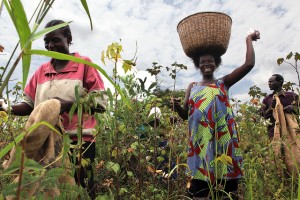Under the theme: “Mutual Accountability in the Formulation and Implementation of country CAADP Investment Plans”, the Sharing-Learning Session focused on: strengthening programme implementation and results at national level; enhancing the participation in, and the ownership of, the CAADP agenda by national stakeholders; and establishing mechanisms for transparent dialogue and mutual review of performance among internal and external stakeholders.
The “Sharing-Learning” Session received reports on the progress and status on CAADP implementation from countries and Regional Economic Communities (RECs). The African Union Commission and the New Partnership for Africa’s Development Planning and Coordinating Agency (AUC/NPCA) shared experiences and drew lessons on CAADP implementation.
The “Business Session” deliberated on key CAADP priorities for 2011 and took decisions on a number of issues that are expected to hasten implementation of national agriculture and food security investment plans.
The meeting noted the significant support RECs and continental organizations including AUC and NPCA have provided to countries in moving CAADP from being a process of mobilization of key stakeholders in evidence-based agricultural planning, to one that created the necessary conditions for generating the required investment finance.
The seventh meeting of CAADP PP also noted that the involvement of non-state actors (NSAs) at all stages of CAADP is crucial for the realization of CAADP targets and results. In particular, the meeting recognized that engagement of NSAs is critical for articulating issues of wider significance for delivering on the broad-based development agenda that CAADP catalyzes. The meeting however noted the challenges NSAs face with respect to their informed participation as equal partners in the CAADP process.
During the closing ceremony, Commissioner Tumusiime Rhoda Peace, Commissioner for Rural Economy and Agriculture, AUC said “We should especially ensure that mutual accountability is grounded in domestic accountability…. As we conclude this meeting, our challenge is two-fold and that is, to ensure we keep up this standard and country-orientation in future meetings of CAADP PP. And the second is to take forward the letter and spirit of what we have undertaken to move Africa’s agriculture, food and nutrition agenda to the greater heights”.
She reaffirmed the commitment of the AUC to continue to take leadership in collaboration with the NEPAD Planning and Coordinating Agency (NPCA), other Pan African Institutions and Partners in keeping up the momentum and pursuing the mutual accountability agenda vigorously in the course of implementing CAADP.
Ms. Julie Howard, of USAID on behalf of the CAADP Development Partners Task Team, underlined that CAADP has been successful in mobilizing national and regional organizations, private sector and farmers for agricultural development on the continent.
Going forward, she expressed the commitment of development partners to align their technical and financial support behind CAADP, inspired national and regional agriculture and food security investment plans.
In her closing remarks, the President of the Pan African Farmers Organization (PAFO), Ms. Elizabeth Atangana said that the CAADP development plan must ensure that women, children and youth are at its centre of implementation. The issue of capacity building, funding, and access to land should be given priority, she said, adding that African leaders need to demonstrate further commitment to investing 10% of their annual budget to agriculture.
Delegates at the seventh meeting of CAADP-PP included AUC, NEPAD, RECs, agriculture experts, private sector, farmers’ group, researchers, development partners, and civil society organizations from across Africa and beyond.

